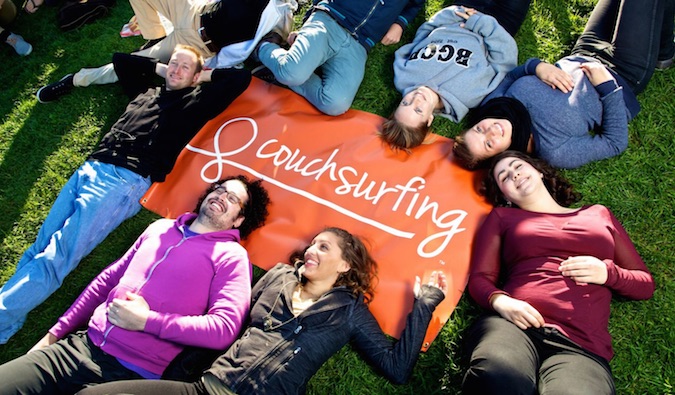
Last Updated: 9/25/20 | September 25th, 2020
Couchsurfing was one of the first sharing economy travel websites in the world.
Couchsurfing was conceived by 21-year-old Casey Fenton in 1999. After he found a cheap flight to Iceland, he realized he didn’t have a place to say.
Instead of settling for a pricey hotel, Fenton hacked into the University of Iceland’s student database and e-mailed 1,500 students asking for a place to stay. Almost 100 people replied. When he returned home, Casey came and started Couchsurfing. From there, the site grew into one of the main ways travelers connect with locals for events and places to stay.
It (and sites like it such as BeWelcome, Servas, and GlobalFreeloaders) remains one of the best ways to connect with locals, get off the main tourist travel path, make new friends, and save money by getting free accommodation.
I started using Couchsurfing during my first round the world trip in 2006. My first host was a woman in Athens who taught me what makes the perfect gyro while my second host a guy who let me stay in his guesthouse (with a pool!) for as long as I wanted and my third a couple in Melbourne who showed me around the suburbs.
Though I used it only a few times that original trip, in the years that have followed, it became my lifeline. I’ve met people I still call friends today. Couchsurfing has opened up a world of amazing people to me while helping bring down on the biggest costs in travel.
Though the service isn’t as popular as it used to be, it remains popular enough where hosts still get inundated with more requests than they can handle and you have to make yourself stand out.
If you’re sending out dozens of requests and no one writes back — even to say no — then something is wrong with your approach. Hosts can usually smell the travelers who just want to use them for a free place to stay a mile away (a lesson I learned the hard way early on).
It’s important to remember that the people you are reaching out to have real lives and are taking you into their home for free. The dates might not work and/or they might get so many requests (and this is very true for popular destinations) they just don’t have the time to respond to them all.
So how do you succeed at Couchsurfing? How do you find people who will say agree to host you but won’t be total creeps? Show that you want to be involved in the community. That you care. That you took the time to fill out your profile in detail and aren’t just using this as a way to avoid paying $30 for a dorm bed.
Here is how to succeed and get a response on Couchsurfing:
Always Have Multiple (and Current) Profile Pictures
This just shows me, as a potential host, that you’re a real person. Have pictures of you with your friends, from your travels, and having fun. I can see you took the time to put the photos up. It shows you care and you have a social life.
Moreover, make sure they match your age. If your profile says you are 30 and your photos look like they were taken ten years ago, that’s a bit weird. Keep them updated. I am constantly adding photos from my travels. I currently have five uploaded. I don’t think there is any magic number to this but the more the better.
Fill Out Your Profile in Detail
If you’ve taken the time to fill out your profile, it probably means you are serious about this site. It will give people a chance to learn what kind of person you are instead of guessing based on the one email you wrote them and that ten-year-old photo you quickly put up. Profiles with thought and detail get a lot more responses. I want to know about the stranger I am going to have in my home, and your complete profile lets me do that.
Have Recommendations and Reviews
Both hosts and travelers can accrue recommendations from other hosts, friends, and guests. As always, the more positive reviews, the better. If you see that other people have stayed with the host and had a fun and safe experience, you probably will too. You might not get along with the host in the end, but at least you know they aren’t a creep or will steal your stuff.
The same works for you, the potential guest. Hosts want to see that you aren’t a creep too!
However, if you are new to the service don’t have any reviews, ask your friends who use the service to write you a review and describe you as a friend. I accept a lot of people as guests because, while they are new to the service, they have positive reviews from people they know (who also have positive reviews), from other people they’ve met traveling, or from Couchsurfing meet-ups.
Attend Meet-ups in Your City
If you’re new to the platform and don’t have any reviews, attend local meet-ups and events. After all, Couchsurfing is more than just staying with people. It’s about being part of a community!
Each city — including your own — will likely lots of regular activities, groups, and events that you can attend. Meet people — whether as a local or a traveler — and get to know them. Go places. Hang out. Get reviews from people. Not all your reviews need to come from people who have stayed with you!
Plus, this is a great way to make new friends who like to travel! You can use the “Hangouts” function on the app to find people near you, suggest activities, and make connections. This is the fastest way to get reviews and grow your account.
Be a Host First
Another way to earn reviews (as well as give back to the community) is to host people. Being a host isn’t always about having people stay with you either. Sometimes it’s just being a tour guide. I’ve had amazing hosts who just showed me their town — from the girl in Ukraine who brought me to a university party, to the guy in Oxford who took me rowing, to the friends in Munich who took me an amazing rock concert.
If you don’t have space to host, offer to take people out and show them around your city. If people have spent time with you — even if they haven’t stayed at your place — you’ll still earn reviews, make new friends, and increase your chances of being hosted down the road!
Get Verified
Couchsurfing offers different levels of verification. Members can be verified by their address, government ID, phone number, and by paying a membership fee. Getting verified is one of the most important things you can do to boost your chances of being hosted. Knowing that a person has been verified reduces the likelihood that they are going to be a crazy psycho killer.
As of 2020, Couchsurfing requires a small fee in order to use the platform (due to their financial struggles from COVID19). Members need to pay $2.39 per month (or $14.29 per year), which provides access to the platform and gets you verified (if you were already verified, you won’t need to pay until 2021).
While it is a cost, it’s a negligible one. The community has tons of value, from its app to its forums to the free accommodation it offers. If you can afford it, I’d encourage you to pay the fee. It’s worth it!
Write Captivating and Personal Requests
When sending out requests for a host, make your request personal. Don’t just write one or two sentences, communicate what you liked about their profile, why you would be a good fit, your habits and hobbies, what you want to get out of it, and what you can offer the host. Be interesting and be personal.
The reason most people fail at Couchsurfing is that they send out boring, generic, cut-and-pasted emails. Here is an example of that:
Hi Matt,
I’m coming to Austin next week for 3 days. Can I stay with you?
Sam
I would ignore or respond no to that email. It doesn’t tell me anything about the person. I have to do the extra work to go to the person’s page, click around, and figure out on my own if this person is normal or not.
A much better email is would be:
Hi Matt,
How are you? I’m coming to Austin next week for three days and saw your host page. Like you, I’m also a big fan of Game of Thrones, whiskey, and Thai food. It would be awesome to have a host who could show me those things around Austin. I’ve heard lots of wonderful things about the city and am looking to get outdoors and explore. I also love to cook and would like to cook you a meal from my country, France! I’m quiet, clean, and won’t be in your way if you need to work or something.
– Sam
That’s the kind of email that would get a response from me! Moreover, Benny Lewis of Fluent in 3 Months, who has hosted over 2,000 couchsurfers, offers this advice:
Think of what you can do for that host. People tend to be very self-centered in their emails and say how amazing a person they are, which would make me roll my eyes a lot. But the odd email would be from someone who picked up on something on my profile, such as a language I’d like to learn and saying that in exchange for the couch, he can teach me some of that language. That would pique my interest and get me to host them more!
When there is a sense that someone deserves to be hosted, forgetting that I’m giving them the roof and local tours, etc., free of charge, it’s a breath of fresh air when someone says that if I take him to a local club, he’ll teach me hip-hop dance moves.
Don’t be self-centered. It’s obvious you are looking for a free place to stay but you have to go beyond that. Let hosts know what you can do for them and why it’s going to be a fun experience.
Send Out Multiple Requests
Part of Couchsurfing is playing the numbers game. It’s just a fact of the system. If you email just one or two people, especially in a city with few hosts, it’s doubtful you’ll find much success. Email as many hosts as possible to maximize your chances. Saying “sorry, I’ve found another host” is not going to cause any bad blood, and most hosts recognize you are emailing multiple people. I don’t email potential hosts who haven’t been active on the site within 30 days because it’s less likely they will respond to you.
Most people fail at Couchsurfing because they just use it as a way to get a free place to stay. They put little effort into it yet expect amazing results. Couchsurfing is an attitude, a way of thinking, and, most importantly, a community.
Not all hosts want to interact with their guests, but even those who want minimal contact still want to meet and talk to interesting people. If they didn’t, they put their place on Airbnb instead.
To crush it on Couchsurfing, you need a positive attitude and a desire to be part of a community.
You can’t just want to use people for a free place.
And always remember to be a good guest: be respectful, be clean, be tidy, and follow any “house” rules set by the hosts.
Book Your Trip: Logistical Tips and Tricks
Book Your Flight
Find a cheap flight by using Skyscanner. It’s my favorite search engine because it searches websites and airlines around the globe so you always know no stone is being left unturned.
Book Your Accommodation
You can book your hostel with Hostelworld. If you want to stay somewhere other than a hostel, use Booking.com as it consistently returns the cheapest rates for guesthouses and hotels.
Don’t Forget Travel Insurance
Travel insurance will protect you against illness, injury, theft, and cancellations. It’s comprehensive protection in case anything goes wrong. I never go on a trip without it as I’ve had to use it many times in the past. My favorite companies that offer the best service and value are:
- SafetyWing (best for everyone)
- Insure My Trip (for those 70 and over)
- Medjet (for additional evacuation coverage)
Want to Travel for Free?
Travel credit cards allow you to earn points that can be redeemed for free flights and accommodation — all without any extra spending. Check out my guide to picking the right card and my current favorites to get started and see the latest best deals.
Need Help Finding Activities for Your Trip?
Get Your Guide is a huge online marketplace where you can find cool walking tours, fun excursions, skip-the-line tickets, private guides, and more.
Ready to Book Your Trip?
Check out my resource page for the best companies to use when you travel. I list all the ones I use when I travel. They are the best in class and you can’t go wrong using them on your trip.


